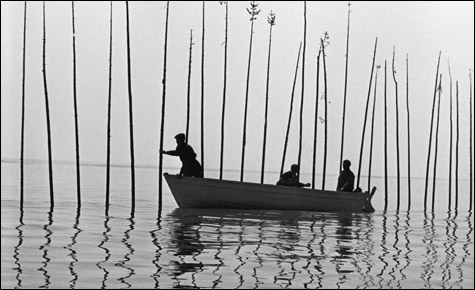
POUR LA SUITE DU MONDE: The crusty, hardy survivors resemble characters out of Renoir’s movies.
|
The rise of the Quebec movie industry coincided with the awakening of French-Canadian cultural and political consciousness in the late ’60s. Until then, the work of Québecois filmmakers was constrained within the bounds of the National Film Board, which turned out mostly documentaries and short subjects. Claude Jutra and Michel Brault, the twin subjects of the marvelous Harvard Film Archive series “Candid Eyes,” which begins Saturday and runs through April 1, met at the Film Board, became close friends, and collaborated on a number of projects. When Jutra made his breakthrough feature, Mon oncle Antoine, in 1971, Brault lit it, and he was the cinematographer on Jutra’s follow-up movie, Kamouraska, too, though he had already been making his own features for several years. Jutra’s career stalled after Kamouraska, and he died under tragic circumstances in the mid ’80s. (Diagnosed with early-onset Alzheimer’s, he threw himself into the St. Lawrence River.) The HFA series covers the golden period of his greatest promise, from the early ’60s through the mid ’70s, providing Boston with the first opportunity to see superb movies like
MON ONCLE ANTOINE
(March 28-29),
KAMOURASKA
(March 30-31), and his one-of-a-kind autobiographical picture,
À TOUT PRENDRE
(March 24-25), since the French Library screened them a decade and a half ago. And it offers us an even rarer chance to see Brault’s films, including the one he’s best known for in his native Quebec,
LES ORDRES
(April 1), a harrowing depiction of the injustices sown by Prime Minister Pierre Trudeau’s passing of the War Measures Act in 1970, in the aftermath of the terrorist activities of the Quebec nationalist group the FLQ.
The series includes a smattering of the documentaries — some short, some full-length — Brault and Jutra turned out at the Film Board. The best is 1963’s
POUR LA SUITE DU MONDE
(March 24-25), directed by Brault and Pierre Perrault, which is about how the tradition of whale fishing, abandoned early in the 20th century, was revived on the tiny island of Île-aux-Coudres. The theme is legacy, and the film spends a lot of time with old-timers whose memories and counsel become precious commodities as the new world seeks a way to reconnect with the old. The crusty, astonishingly hardy survivors resemble characters out of Renoir’s movies.
For me, a Montreal-born Anglo who (like most Canadians) didn’t encounter the work of these gifted men until Mon oncle Antoine, the most astonishing revelations in the series are the two fiction films Brault made in the mid ’60s, “LE TEMPS PERDU|THE END OF SUMMER” (March 26-27) and
ENTRE LE MER ET L’EAU DOUCE|BETWEEN SWEET AND SALT WATER
(March 28-29). Both are gentle, allusive coming-of-age stories. “Le temps perdu,” which runs just 27 minutes, comprises the memory of a teenage girl, as she stands in the middle of a snowfall, of the last days of summer. The only available print has no English subtitles, but you won’t need them — there isn’t much dialogue, and the adolescent characters wear their feelings on their sleeves. It’s a small reverie, captured by a filmmaker with an open heart and a first-rate eye for composition. (All of the Brault movies in this collection, and all of Jutra’s, are magnificent to look at.) Entre le mer et l’eau douce follows the adventures of a young musician (Claude Gauthier, a co-star of Les ordres) who leaves a small fishing community not unlike the one depicted in Pour la suite du monde to seek fame in Montreal. He bunks with his brother in a boarding house and takes a series of odd jobs; he finds uncomplicated romance with a waitress (Geneviève Bujold, who mesmerizes the camera) and then moves past her. It’s an unexpectedly poignant little picture. The reunion between Gauthier and Bujold, after he’s become a success, may remind you of the final tête-à-tête between the lovers in Jacques Demy’s Les parapluies de Cherbourg|The Umbrellas of Cherbourg.
Entre le mer et l’eau douce is the kind of small, personal film that hardly anyone makes any more. So is Jutra’s À tout prendre, but it’s much quirkier. Jutra had absorbed the influences of the French New Wave directors, and this film, released in 1964, was his way of keeping faith with them, though a Québecois version of the New Wave has a different feel — it’s more modest, folksier. Jutra, a terrific actor, plays the hero, Claude, whose sexual life is the film’s main focus. (One of the women he sleeps with is played by Monique Mercure, who became one of the most distinguished actresses in Quebec. The chance to see Mercure and Bujold — the first French-Canadian performer to become famous outside Quebec — in the first bloom of their career is an additional pleasure of this series.)